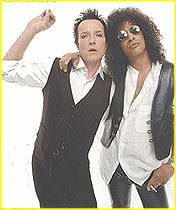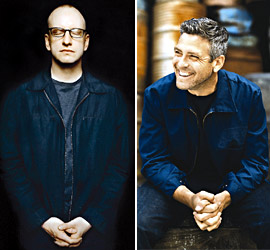Submitted by ben on Fri, 05/12/2006 - 13:01
Submitted by Mahoney on Fri, 05/12/2006 - 03:14
 You know it the moment you see them on your backlit screen: that celebrity probably has a deviant sex life. Some of them are just too obvious; others maybe not. I have compiled a list of a few of the more striking candidates, paired with their –philia of note. Now just kick back and let the headlines roll in...(click “read more” down there to see the full list).
You know it the moment you see them on your backlit screen: that celebrity probably has a deviant sex life. Some of them are just too obvious; others maybe not. I have compiled a list of a few of the more striking candidates, paired with their –philia of note. Now just kick back and let the headlines roll in...(click “read more” down there to see the full list).
Submitted by Dan on Wed, 05/10/2006 - 01:15
 The weather around Cosmodrome HQ has been getting warmer as of late and that means only one thing: Reggaeton. Apartment windows open up, car windows roll down, and soon all the streets are filled with crashing waves of Latin dance music that had been formerly concealed by winter weather. Don't get us wrong, we're into Reggaeton - it makes us feel all woozy inside.
The weather around Cosmodrome HQ has been getting warmer as of late and that means only one thing: Reggaeton. Apartment windows open up, car windows roll down, and soon all the streets are filled with crashing waves of Latin dance music that had been formerly concealed by winter weather. Don't get us wrong, we're into Reggaeton - it makes us feel all woozy inside.
Submitted by Jeff on Tue, 05/09/2006 - 23:45
 If there has been one ego to overshadow those of recent American film directors it is that of Harvey Weinstein.
If there has been one ego to overshadow those of recent American film directors it is that of Harvey Weinstein.
Submitted by Dan on Tue, 05/02/2006 - 21:38
Name: Krasdale Chocolate Flavored Syrup
Submitted by Jon Lefkovitz on Mon, 05/01/2006 - 13:06


Rarely have movies about movies been officially acknowledged as a cinematic subgenre. And yet, there have been hundreds of them from many different countries and time periods. When watching a movie whose narrative is in some way a reflection on the filmmaking process, most cinephiles can achieve instant orgasms without having to lift a finger. Does the very self-reflective nature of these films make them inherently vain?
Yes.
Submitted by mwang on Sat, 04/29/2006 - 19:30
 While most nights, you’d probably find me on the couch watching TV and eating something from a box out of a pot precariously balanced on my lap, most know I’ll eat just about anything, especially if free. A week or two ago, I found myself delving into some Asian food. Not the most exciting, right?
While most nights, you’d probably find me on the couch watching TV and eating something from a box out of a pot precariously balanced on my lap, most know I’ll eat just about anything, especially if free. A week or two ago, I found myself delving into some Asian food. Not the most exciting, right?
Submitted by Jeff on Fri, 04/28/2006 - 11:04
 I have seen very few of my favorite movies in the theater. This is just one of the realities that young cinephiles must accept. Even when I go see Chinatown or Blue Velvet in repertory cinemas, it isn't the first time I'm seeing those films. A lot of the magic happens on DVD.
I have seen very few of my favorite movies in the theater. This is just one of the realities that young cinephiles must accept. Even when I go see Chinatown or Blue Velvet in repertory cinemas, it isn't the first time I'm seeing those films. A lot of the magic happens on DVD.
United 93 gave me a magical theatrical experience, the likes of which I can only remember feeling twice in recent memory (Requiem for a Dream and Birth).
Going in to the Tribeca premiere, my expectations were occupied by the questions the trades have all been asking about the film: "Are audiences ready for a movie about 9/11?" and "How tasteful will the film be?" For me, the answer to both of these questions has to do with how "definitive" the film attempts to be - if it achieves the status of being the "definitive" 9/11 movie, then audiences are probably more likely to accept it. At the same time, it is precisely that aim for "definitiveness" that strikes me as distasteful.
Though the extra-textual United 93 marketing campaign will self-righteously try and paint the film as "the definitive 9/11 movie" (as Paramount will try to do later this year for Oliver Stone's World Trade Center), United 93 itself manages to avoid such self-importance in at least three ways. Read on...
Submitted by DanteBronte on Thu, 04/27/2006 - 10:21
 It is a question tens and thousands of fans have asked themselves in recent years, as Axl and Slash continue their decade long brawl / marketing saga. The world is hungry for the follow up to the Spaghetti Incident! So hungry that they have divided into THREE PARTS.
It is a question tens and thousands of fans have asked themselves in recent years, as Axl and Slash continue their decade long brawl / marketing saga. The world is hungry for the follow up to the Spaghetti Incident! So hungry that they have divided into THREE PARTS.
PART 1: Iron Butterfly. Led Zeppelin. Velvet Revolver.
This part of the world believes that Velver Revolver is the reincarnation of the great rock gods of the 60s. Slash and Scott Weiland are the long lost twins of hard rock, the Cain and Abel, the Izhak and Esau. Like Bilbo Baggins, pay homage to the greats with a replica of their cock rings from your gold chain necklace. And if you idolize the Velvet Revolver, you believe that your band must be named in the Classical late Sixties style of having two contractictory elements, objects or ideas.
Part 2: Go ahead and name yourself after a God. Why not two Gods??
This part of the world wakes up every morning and asks himself or herself something along the lines of: "How much more obnoxious can the world get, now that George W. Bush has a former Fox News commentator as his secretary? " Well, name your rock band after one of the most original rock sounds ever created. Follow that word with a name that alludes to one of the most pure and innovative pop-rock albums in the history of mankind, and you've created a marketing concept so insanely low -- how could it fail?
Submitted by Jeff on Wed, 04/26/2006 - 00:15
 The “auteur” is a filmmaker who is generally expected to make personal cinema. Auteur-films tend to be celebrated for how well they relate unique experience – in terms of theme, Bergman’s preoccupation with death or Truffaut’s with youth; in terms of style, Hitchcock’s use of suspense or Rossellini’s minimalism; in terms of location, Scorsese’s Little Italy or Paul Thomas Anderson’s Valley or Malick’s countryside. The specificity of the auteur’s experience is met by a specific audience. In other words, a limited one.
The “auteur” is a filmmaker who is generally expected to make personal cinema. Auteur-films tend to be celebrated for how well they relate unique experience – in terms of theme, Bergman’s preoccupation with death or Truffaut’s with youth; in terms of style, Hitchcock’s use of suspense or Rossellini’s minimalism; in terms of location, Scorsese’s Little Italy or Paul Thomas Anderson’s Valley or Malick’s countryside. The specificity of the auteur’s experience is met by a specific audience. In other words, a limited one.
One way to gnaw away at the dominance of auteurism in today’s movie culture is to dismantle the notion that a film’s quality is proportional to how much it can alienate mass audiences. 1930s French cinema and classic Hollywood cinema both managed to produce movies that could unite disparate audiences without sacrificing quality. Even Hollywood cinema in the 1970s, so often lauded for its auteurs, could be argued to have produced good movies more as a result of its knack for finding a wide audience. In fact, it was the pomposity of auteurism that ultimately ruined the cycle of great ‘70s cinema: Michael Cimino made sure of that by demanding an outrageous sum of money to realize his all-important “vision," Heaven’s Gate. The commercial and critical failure of Heaven’s Gate signaled the end of that great era. But the ‘70s paradigm emerged once more in a movement that is often referred to as “Indiewood,” or the “New Middle.” Read on...
Pages